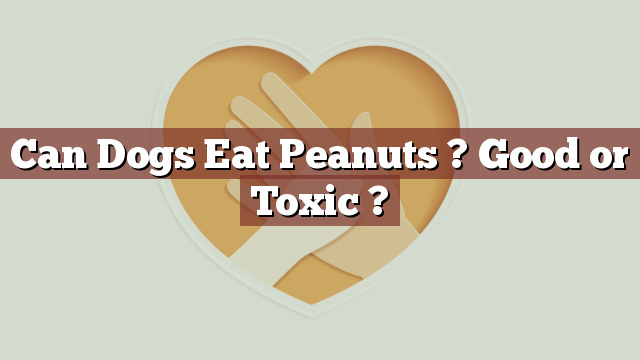Can dogs eat peanuts? This is a common question among dog owners who are concerned about their pets’ diet and well-being. It is important to know which foods are safe for dogs to consume and which ones can be potentially harmful. In this article, we will explore whether peanuts can be included in a dog’s diet and if they are good or toxic for them.
Nutritional Value of Peanuts: Vitamins, Minerals, and Protein Content
Peanuts are known for their rich nutritional profile. They are a good source of vitamins, minerals, and protein. Peanuts contain essential nutrients such as vitamin E, niacin, and folate, which are beneficial for both humans and animals. Additionally, they are high in protein and healthy fats, making them a desirable snack for many individuals.
Can Dogs Eat Peanuts: Safety Considerations and Potential Risks
Can dogs eat peanuts? Yes, dogs can eat peanuts, but certain safety considerations need to be taken into account. While peanuts are not inherently toxic to dogs, they can pose risks if consumed in excessive amounts or if the dog has certain health conditions.
One of the main concerns with feeding peanuts to dogs is the potential for allergies. Just like humans, dogs can develop allergies to certain foods, including peanuts. Symptoms of an allergic reaction in dogs may include itching, skin irritation, digestive issues, and difficulty breathing. It is essential to monitor your dog closely after introducing peanuts into their diet and seek veterinary advice if any allergic reactions occur.
Potential Risks and Benefits of Feeding Peanuts to Dogs
Feeding peanuts to dogs can have both risks and benefits. On the one hand, peanuts provide dogs with a good source of protein and healthy fats. They can be a tasty and nutritious addition to their diet when given in moderation. However, it is crucial to be mindful of potential health risks associated with peanuts, such as allergies or gastrointestinal issues.
Moreover, peanuts are often salted or flavored, which can be harmful to dogs. Salted peanuts, in particular, can lead to excessive sodium intake, causing dehydration and other health problems. It is advisable to opt for unsalted and unflavored peanuts if you choose to include them in your dog’s diet.
What to Do if Your Dog Consumes Peanuts: Tips and Advice
If your dog accidentally consumes peanuts or exhibits any signs of an allergic reaction or discomfort, it is important to take prompt action. Here are some tips and advice to follow:
-
Monitor your dog: Keep a close eye on your dog’s behavior and any physical symptoms after they have eaten peanuts. Look out for signs of allergies or digestive issues.
-
Consult a vet: If your dog shows any concerning symptoms or discomfort, it is best to consult a veterinarian. They can provide appropriate guidance and recommend necessary steps to ensure your dog’s health and well-being.
-
Avoid giving flavored or salted peanuts: As mentioned earlier, flavored or salted peanuts can be harmful to dogs. Stick to unsalted and unflavored varieties if you choose to feed peanuts to your dog.
Conclusion: Moderation is Key – Peanuts Can be Safe for Dogs
In conclusion, dogs can eat peanuts, but it is crucial to do so in moderation and with caution. Peanuts can offer nutritional benefits to dogs, such as protein and healthy fats. However, allergies and potential gastrointestinal issues can arise, so it is important to introduce peanuts gradually and monitor your dog’s reaction.
Always remember to consult your veterinarian before making any significant changes to your dog’s diet or introducing new foods. They can provide personalized advice based on your dog’s specific needs and ensure their overall health and well-being.
Thank you for investing your time in exploring [page_title] on Can-Eat.org. Our goal is to provide readers like you with thorough and reliable information about various dietary topics. Each article, including [page_title], stems from diligent research and a passion for understanding the nuances of our food choices. We believe that knowledge is a vital step towards making informed and healthy decisions. However, while "[page_title]" sheds light on its specific topic, it's crucial to remember that everyone's body reacts differently to foods and dietary changes. What might be beneficial for one person could have different effects on another. Before you consider integrating suggestions or insights from "[page_title]" into your diet, it's always wise to consult with a nutritionist or healthcare professional. Their specialized knowledge ensures that you're making choices best suited to your individual health needs. As you navigate [page_title], be mindful of potential allergies, intolerances, or unique dietary requirements you may have. No singular article can capture the vast diversity of human health, and individualized guidance is invaluable. The content provided in [page_title] serves as a general guide. It is not, by any means, a substitute for personalized medical or nutritional advice. Your health should always be the top priority, and professional guidance is the best path forward. In your journey towards a balanced and nutritious lifestyle, we hope that [page_title] serves as a helpful stepping stone. Remember, informed decisions lead to healthier outcomes. Thank you for trusting Can-Eat.org. Continue exploring, learning, and prioritizing your health. Cheers to a well-informed and healthier future!

